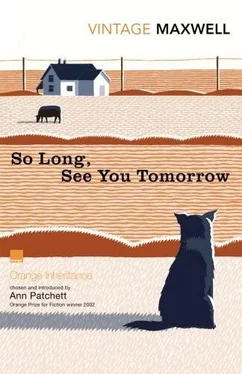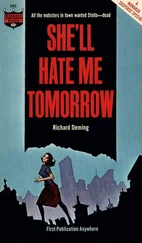I seem to remember that I went to the new house one winter day and saw snow descending through the attic to the upstairs bedrooms. It could also be that I never did any such thing, for I am fairly certain that in a snapshot album I have lost track of there was a picture of the house taken in the circumstances I have just described, and it is possible that I am remembering that rather than an actual experience. What we, or at any rate what I, refer to confidently as memory — meaning a moment, a scene, a fact that has been subjected to a fixative and thereby rescued from oblivion — is really a form of storytelling that goes on continually in the mind and often changes with the telling. Too many conflicting emotional interests are involved for life ever to be wholly acceptable, and possibly it is the work of the storyteller to rearrange things so that they conform to this end. In any case, in talking about the past we lie with every breath we draw.
Before the stairway was in, there was a gaping hole in the center of the house and you had to use the carpenters’ rickety ladder to get to the second floor. One day I looked down through this hole and saw Cletus Smith standing on a pile of lumber looking at me. I suppose I said, “Come on up.” Anyway, he did. We stood looking out at the unlit streetlamp, through a square opening that was someday going to be a window, and then we climbed up another ladder and walked along horizontal two-by-sixes with our arms outstretched, teetering like circus acrobats on the high wire. We could have fallen all the way through to the basement and broken an arm or a leg but we didn’t.
Boys don’t need much of an excuse to get on well together, if they get on at all. I was glad for his company, and pleased when he turned up the next day. If I saw him now the way he was then, I don’t know that I would recognize him. I seem to remember his smile, and that he had large hands and feet for a boy of thirteen. And Cletus Smith isn’t his real name.
Did I know him because he was in my room at school? I try to picture him standing at the blackboard and can’t. It is so long ago. Were we in the same Boy Scout troop, which would have meant that at some time during that fall we had studied the Scout manual together and practiced tying reef knots and clove hitches and running bowlines, and considered what merit badges we would try for next? I don’t know the answer. I only know that I knew him. From somewhere. And that we played together in that unfinished house day after day, risking our necks and breathing in the rancid odor of sawdust and shavings and fresh-cut lumber.
Ninth Street was an extension of home, and perfectly safe. Nobody ever picked on me there. When I passed beyond Ninth Street, it could be rough going. The boys in the eighth grade dominated the school yard before school and at recess time. They were, by turns, good-natured in a patronizing way, or mean, or foulmouthed about girls, or single-mindedly bent on improving their proficiency in some sport. Sometimes they would go to the trouble of twisting a younger boy’s arm behind his back or put a foot out and trip him as he ran past, and if he fell and hurt himself they were happy for a whole quarter of an hour afterward, but their attention seldom settled on any one boy for very long.
Looking back, it seems clear enough that I brought my difficulties on myself. To begin with, I was as thin as a stick. In any kind of competitive game, my mind froze and I became half-paralyzed. The baseball could be counted on to slip through my overanxious fingers. Nobody wanted me on their team. I was a character. I also had the unfortunate habit, when called on in class, of coming up with the right answer. It won me a smile of approval from the teacher, and it was nice to see my name on the Honor Roll. It was not nice to be chased home from school by two coal miners’ sons who were in the same room with me but only because they could not escape from the truant officer. Nowhere was I safe against them — neither in the classroom, where their eyes were always on me, or in the school yard, where they danced around me, pushing me off balance and trying to get me to fight back so they could clean up on me.
All this took place in plain sight of everybody, all the boys I had grown up with, and no hand was ever raised in my defense, nobody ever came to my rescue — I expect partly because they had their own vulnerabilities and did not want to be singled out for attack, but obviously there was something in me that invited it. Since I did not know what it was, I couldn’t do anything to change it, and any emotion I felt — physical inadequacy, fear, humiliation, the whole repertoire of the adolescent — showed in my face. I was such easy game that I wonder that their pleasure in tormenting me lasted as long as it did. When they were fourteen they dropped out of school and I never saw them again. Where else could they have gone but down in the mine with their fathers? If somebody told me they had contracted black lung I don’t know that I could manage to be sorry.
The gap between my older brother and me was too great for me to emulate his pleasures or contribute to them, and I would have been glad for a brother nearer my own age, to defend me when I got in trouble, and to do things with. At about this time, one of my mother's friends, a woman I knew but not very well, invited me to come to her house after school on Friday and stay until Sunday afternoon. She had a son who was a year or two older than I was and everything a boy that age ought to be-open and easy with adults, bright in school, and beyond being pushed around by his contemporaries. I slept in the same room with him and I was with him all day Saturday and Sunday. Without any experience to go on, I tried to be a good guest. Most of the time he was friendly, and then suddenly he would mutter something under his breath that I could not quite hear and that I knew from a heaviness in my heart was the word "sissy." I ignored it, not knowing what else to do; not having enough experience of the world to take my toothbrush and pyjamas and go home, leaving him to explain to his mother why I wasn't there. At bedtime, standing by the wide-open window of his room, he had me do setting-up exercises with him. He was patient when I didn't do them right, and also funny, and it was so nice to be doing something with another boy for a change. But then he muttered that word under his breath that I wasn't supposed to be able to say that he had actually said. He was exactly the kind of boy I would have liked to be, and I was ready to imitate him in any way I could. One minute I was encouraged to do this and the next I felt — I was made to feel-that he despised me. Probably all it amounted to was that his mother had decided on this act of kindness without consulting him, and he was angry because my being there had spoiled his Saturday. In any case, the point I am trying to make is that it was a new experience for me to have the companionship of another boy day after day. Whatever I suggested doing we did. I never asked Cletus if there wasn't something he'd rather be doing, because he was always ready to do what I wanted to do. It occurs to me now that he was not very different from an imaginary playmate. When I was with him, if I said something the boys in the school yard would have jeered at, he let the opportunity pass and went on carefully teetering with one foot in front of the other, or at most, without glancing in my direction, which would have endangered his balance, nodded.
I supposed he must have liked me somewhat or he wouldn't have been there. And that he was glad for my companionship. He didn't act as if there was some other boy waiting for him to turn up. He must have understood that I was going to live in this house when it was finished, but it didn't occur to me to wonder where he lived.
Читать дальше












